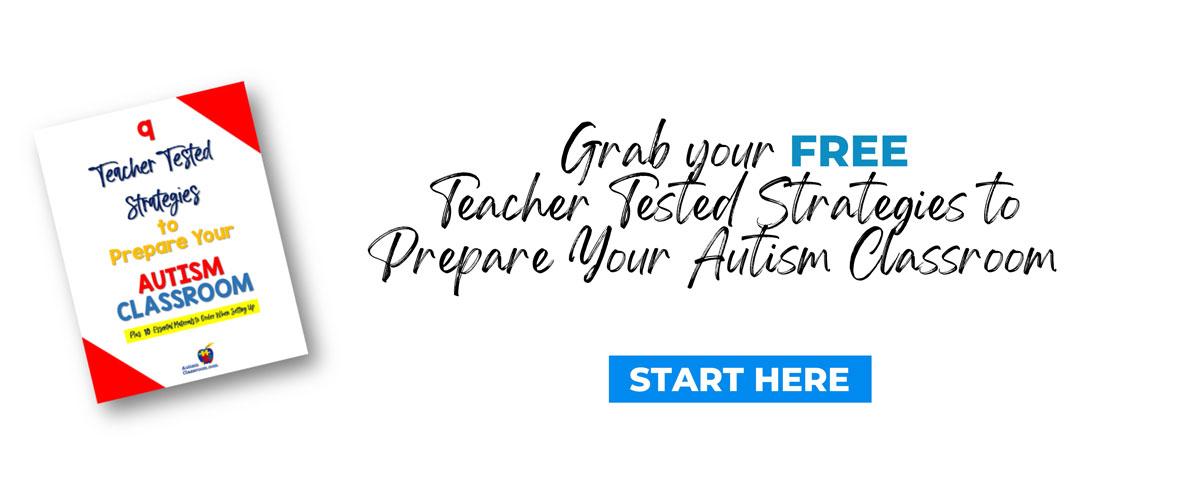Think of a time a student has frozen during a group activity because they can’t remember the steps. It feels like they may not have even been there when you went over the skill the day before. Or even the day before that. The same student can’t seem to shift gears when plans change, without a lot of tears or even a slow slide to the floor, and maybe even a full-on “nope” from their whole body.
Sound familiar? Welcome to the world of executive functioning challenges.
With a few strategies, you can aim to help your students with intensive needs build the tools they need to improve their executive functioning skills. Whether it’s helping them transition between activities without a meltdown or remembering multi-step tasks without freezing, the way to approach it is in the everyday moments.
Now, the real question is, is there a way to sneak those skills into your routine without adding 25 more things to your to-do list?
What is Executive Functioning?
Executive functioning refers to cognitive skills that help people manage their thoughts, actions, and emotions to achieve goals. For students with intensive needs, particularly those with autism or other special needs, developing these skills is a longer process.
This set of skills impacts every aspect of their daily lives, from staying focused in the classroom to managing emotions during transitions. Executive functioning challenges in autism can make it difficult for students to plan, organize, and complete tasks independently.
Why Executive Functioning Skills Matter
Executive dysfunction in students with autism presents unique challenges for students, as differences in brain processing can impact skills like working memory, impulse control, and flexible thinking.
Many children with autism struggle with executive functioning tasks such as managing time, staying organized, and adapting to changes in routine. These difficulties can affect their ability to complete assignments, follow multi-step directions, and engage in social interactions.
With structured support, visual aids, and consistent strategies, students with autism and executive functioning challenges can build up their skills needed to navigate daily tasks more independently.
Key Executive Functioning Skills to Focus On
When working with students with intensive needs, prioritize these foundational executive functioning skills:
1. Task Initiation and Completion
Many students struggle to start tasks independently or they struggle to follow through to completion. Strengthening this skill helps them understand how to begin and sustain effort. Here are some things to try:
- Use visual schedules and checklists to provide clear structure and guidance.
- Provide verbal or visual cues to prompt action, such as timers or "first, then" charts.
- Reinforce small wins to build momentum and motivation.
2. Emotional Regulation
Managing emotions is critical for maintaining focus and building positive relationships, especially for students with autism. Here are some things to try:
- Create a "calm corner" in the classroom with sensory tools, weighted blankets, or calming visuals.
- Teach coping strategies like deep breathing, squeezing a stress ball, or using a communication board to express feelings.
- Give them the language to use and model appropriate responses to frustration or setbacks.
3. Working Memory
Working memory helps students hold and manipulate information, like remembering instructions while completing a task. Some strategies for students with autism to improve their working memory are:
- Break down instructions into smaller, manageable steps.
- Use visual aids such as charts, checklists, or task cards.
- Repeat instructions or give time for students to repeat them back to themselves before they react.
4. Flexibility and Adaptability
Students with autism often thrive on structure, so changes in routine or unexpected challenges can feel overwhelming. Without support, these disruptions may lead to frustration, anxiety, or difficulty transitioning. Some strategies for teaching flexibility and coping strategies are:
- Use social stories to prepare students for transitions or new experiences.
- Practice role-playing scenarios to develop problem-solving skills.
- Incorporate a consistent but flexible routine, so students know what to expect while learning to adapt.
5. Organization and Time Management
Organization and time management are skills that help students manage their materials, keep track of assignments, and understand time constraints. Strategies to strengthen these skills are:
- Provide labeled bins or folders for organizing materials.
- Use color-coded systems for different subjects or tasks.
- Introduce visual timers to help students understand and manage time.
As autism educators, we know that these skills do not come naturally for our students, so we must teach executive functioning skills explicitly and repeatedly. I have a set of executive functioning printables that focus on the skills you want to teach.
These printables are made to accommodate the various learning styles and abilities of students with intensive needs and autism. The packet includes executive functioning skills worksheets that require variations in response styles for many answers. Students who may have trouble with writing, can answer by matching, cutting, circling, and pasting.

Find the Executive Functioning Skills Printables for Students (Life Skills/Autism/SPED) here.
With these worksheets, students will work on planning, organizing, time management, working memory, self-control, impulse control, attention, flexibility, perseverance, transitioning, and problem-solving.
Here is a list of all the worksheets that are included:
Planning:
Plan
Waiting
My Schedule
Planning for an Art Project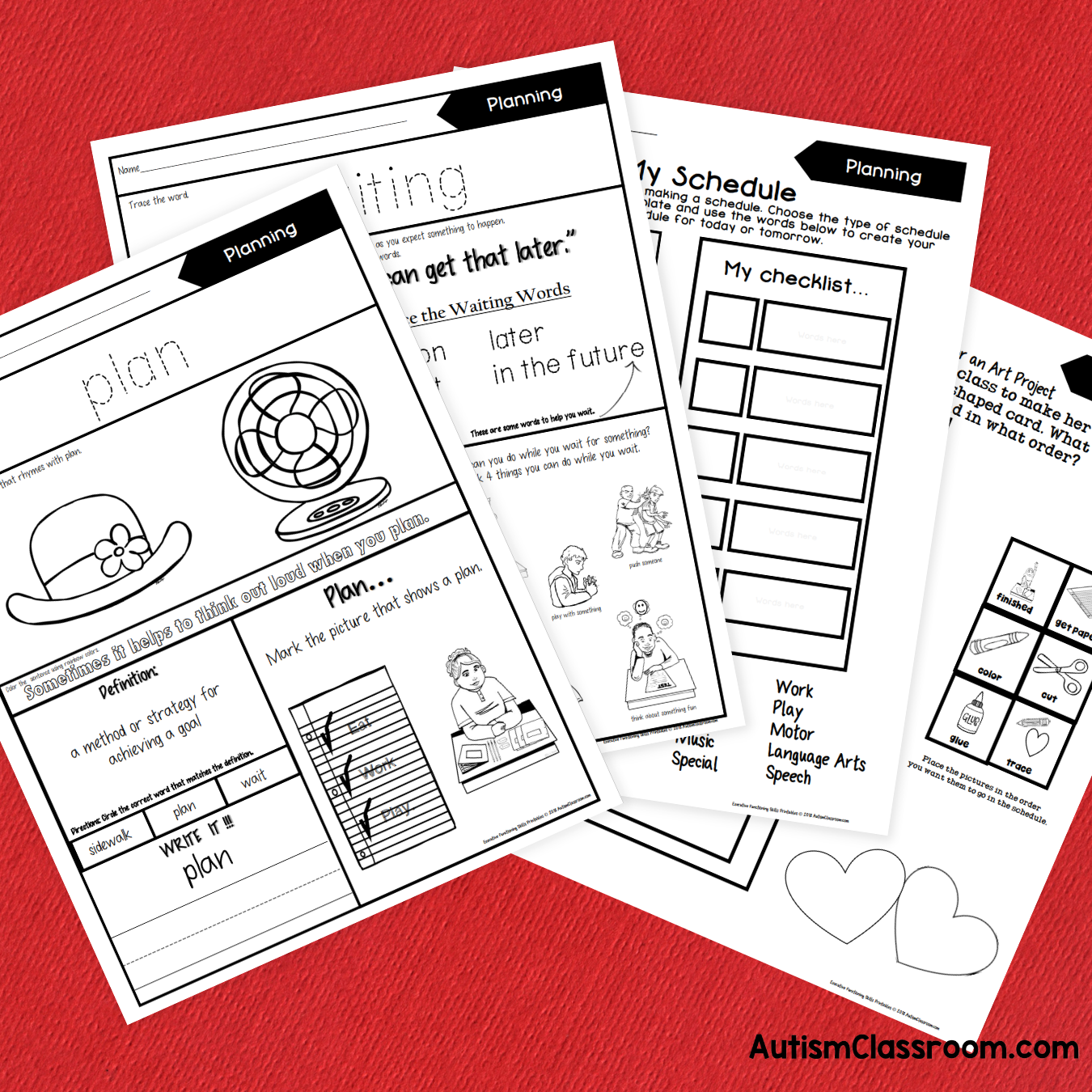
Organizing:
Organize the Code
Organized/Unorganized
Organizing My Desk
I Can Organize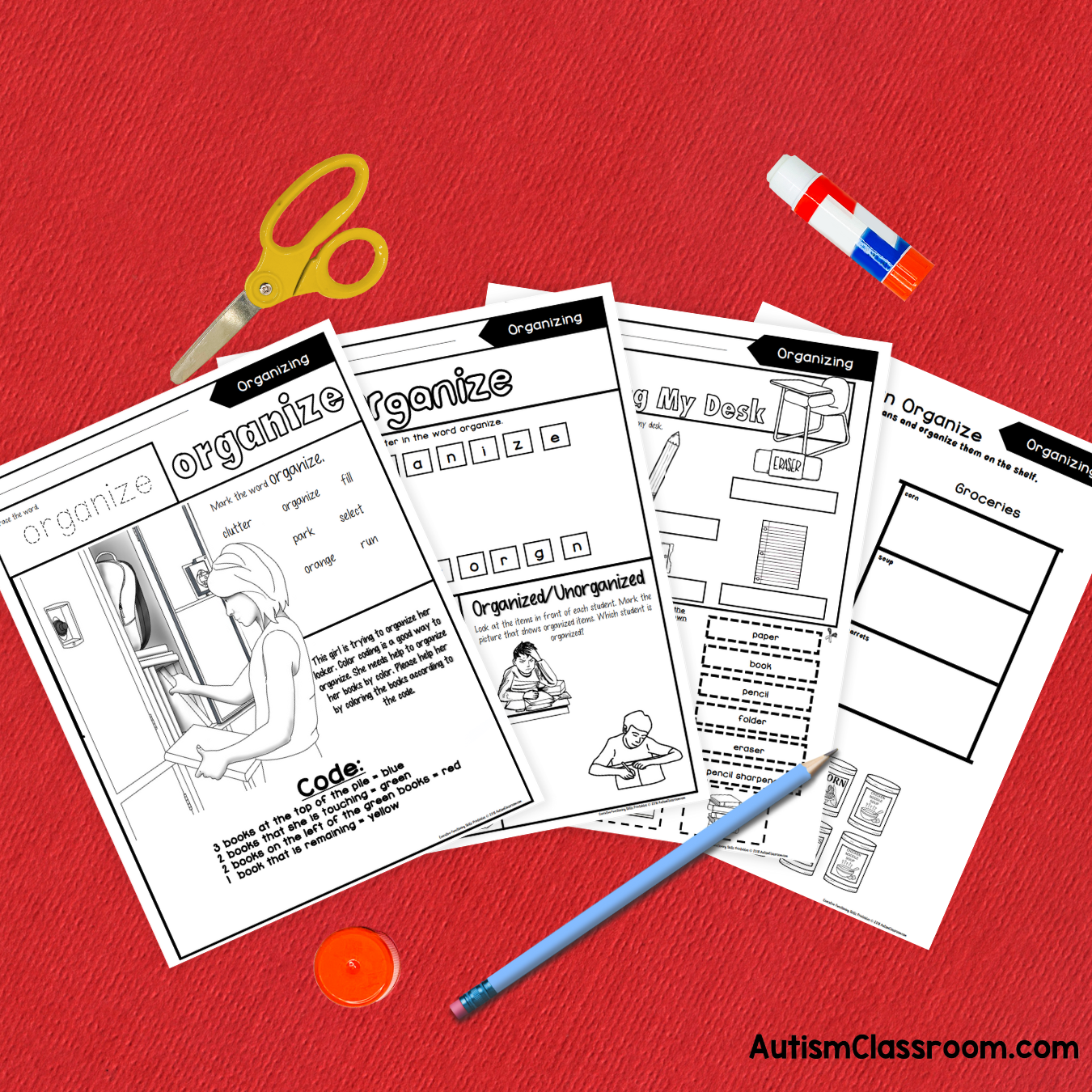
Time Management:
Is it Time?
Using Timers
Smart Watch
Task Initiation
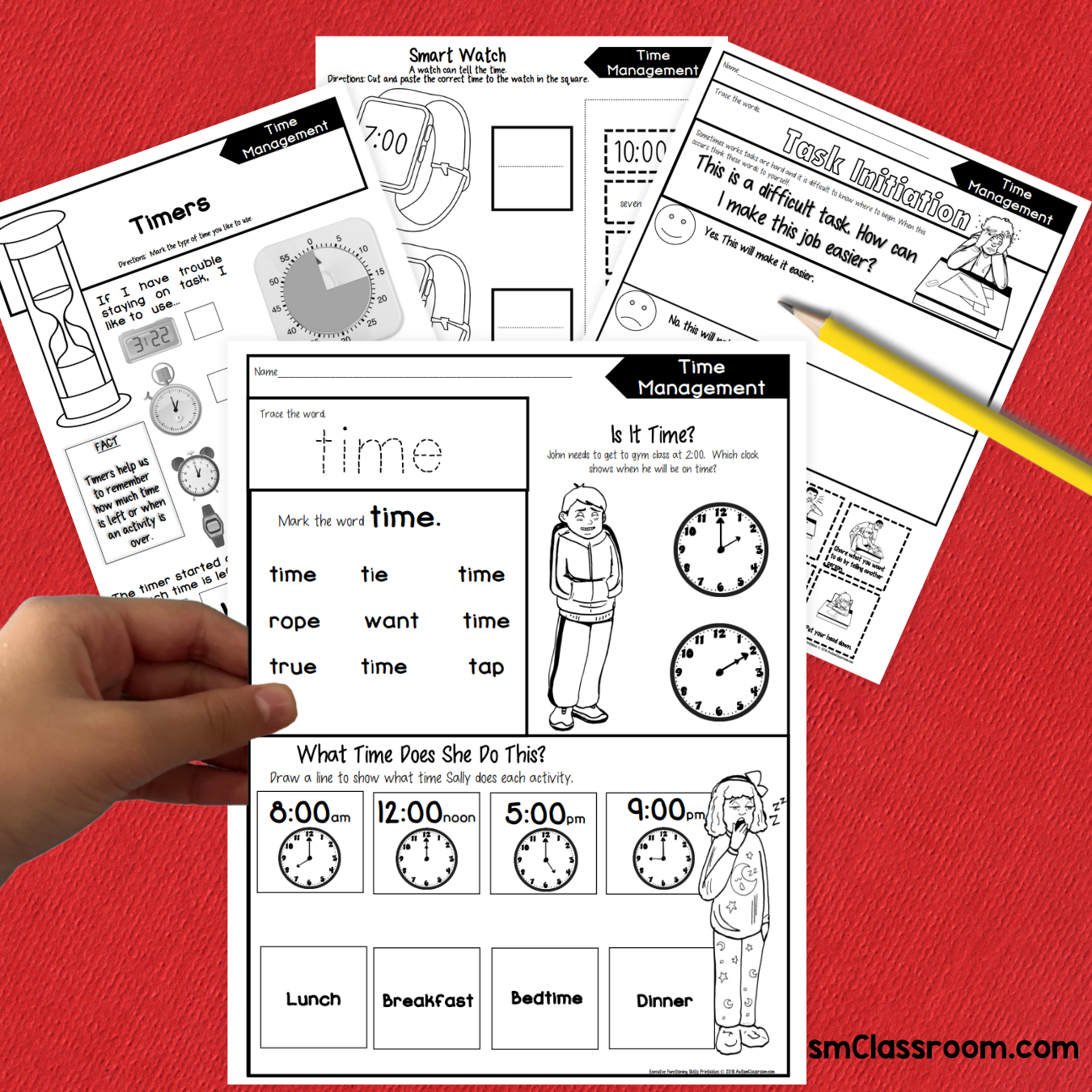
Working Memory:
Repeat After Me
Remember
Multi-step Directions
Letter and Word Search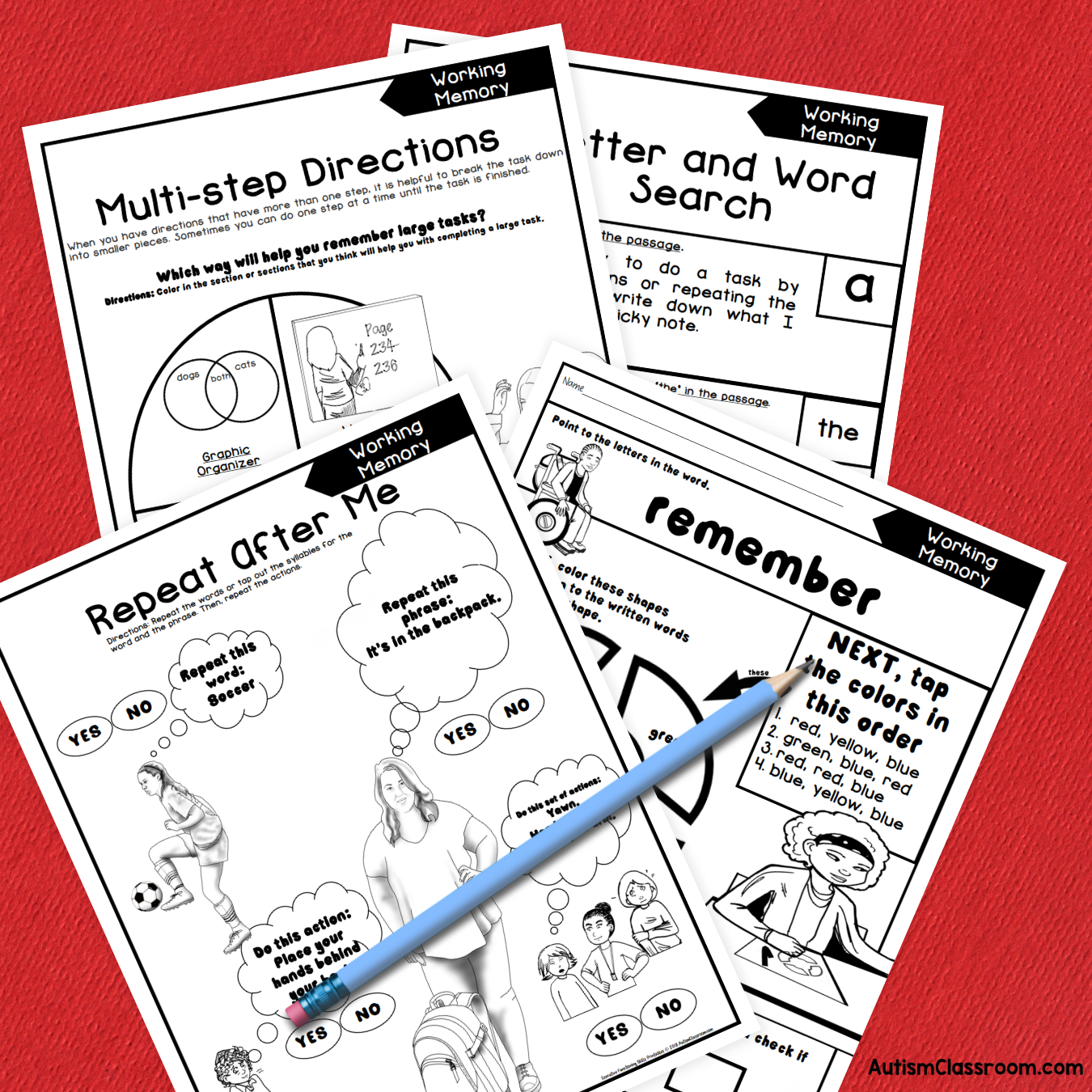
Self- Control:
Controlling My Actions
Emojis
Feelings
Self-Discipline
Impulse Control:
Personal Bubble
Controlling My Impulses
Stop Raging
Making a Choice
Attention:
Listening
Visual Schedules
Show Listening Skills By Doing These Things
Staying On Task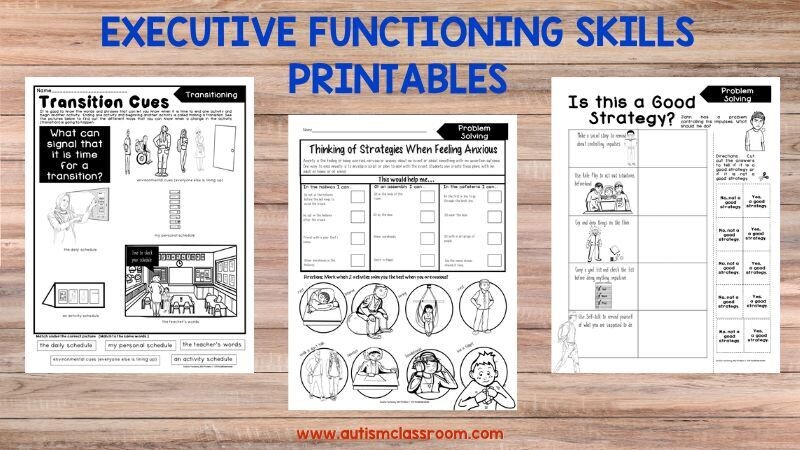
Flexibility:
Flexibility Definition
Planning a Calendar
Starting a Non-Preferred Activity
Changing Plans
Perseverance:
Perseverance Word Search
A Story About Perseverance
Working to Build Sentences
Work Through It
Transitioning:
Change-What Things Can Change?
Starting a New Assignment
Working Until My Scheduled Break
Transition Cues
Problem Solving:
Steps to Problem Solving
Is this a Good Strategy?
Visualize It
Thinking of Strategies When Feeling Anxious
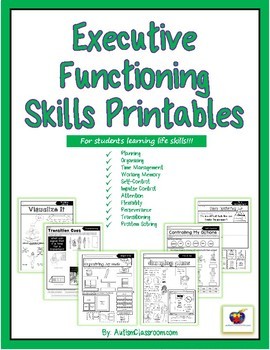
These executive functioning skills printables will also be a gift to you because you can build off of some of the activities and see where a students might need more instruction. And, you do not have to make or curate them yourself!!! Skip one spiced latte or if you are like me, an iced tea from Dunkin' and your in there, with activities for weeks.
P.S. If you don’t feel like printing everything out, get the workbook. The Executive Functioning Skills Printable Workbook has the same topics. 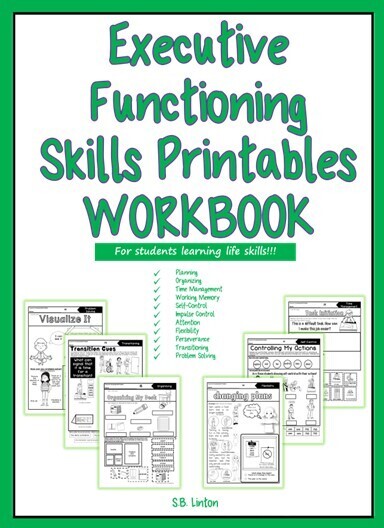
For more tips for the classroom, check out these posts:
- The Key to Teaching Fine Motor Skills Autism Support Teachers Want to Know
- The Social Skills Bundle: Teach Imitation, Play and More with these Resources
- Our Interactive Social Skills Binder for Students with Autism


